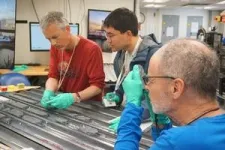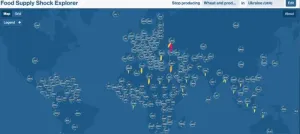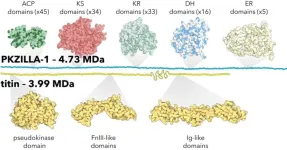(Press-News.org) Scientists have recovered the first long section of rocks that originated in the Earth’s mantle, the layer below the crust and the planet’s largest component.
The rocks will help unravel the mantle’s role in the origins of life on Earth, the volcanic activity generated when it melts, and how it drives the global cycles of important elements such as carbon and hydrogen, according to the team.
The nearly continuous 1,268 metres of mantle rock was recovered from a “tectonic window,” a section of the seabed where rocks from the mantle were exposed along the Mid-Atlantic Ridge, during Expedition 399 “Building Blocks of Life, Atlantis Massif” of the ocean drilling vessel JOIDES Resolution in Spring 2023.
With attempts dating back to the early 1960s, the recovery was a record-breaking achievement led by the International Ocean Discovery Program, an international marine research consortium of more than 20 countries that retrieves cores—cylindrical samples of sediment and rock—from the ocean floor to study Earth’s history.
Since then, the expedition team has been compiling an inventory of the recovered mantle rocks to understand their composition, structure and context.
Their findings, presented in the journal Science, reveal a more extensive history of melting in the recovered rocks than expected.
Lead author Professor Johan Lissenberg from Cardiff University’s School of Earth and Environmental Sciences, said: “When we recovered the rocks last year, it was a major achievement in the history of the Earth sciences, but, more than that, its value is in what the cores of mantle rocks could tell us about the makeup and evolution of our planet.
“Our study begins to look at the composition of the mantle by documenting the mineralogy of the recovered rocks, as well as their chemical makeup.
“Our results differ from what we expected. There is a lot less of the mineral pyroxene in the rocks, and the rocks have got very high concentrations of magnesium, both of which results from much higher amounts of melting than what we would have predicted.”
This melting occurred as the mantle rose from the deeper parts of the Earth towards the surface.
Results from further analysis of this process could have major implications for the understanding of how magma is formed and leads to volcanism, the researchers claim.
“We also found channels through which melt was transported through the mantle, and so we are able to track the fate of magma after it is formed and travels upwards to the Earth’s surface.
“This is important because it tells us how the mantle melts and feeds volcanoes, particularly those on the ocean floor that account for the majority of volcanism on Earth. Having access to these mantle rocks will allow us to make the connection between the volcanoes and the ultimate source of their magmas.”
The study also provides initial results on how olivine, an abundant mineral in mantle rocks, reacts with seawater, leading to a series of chemical reactions that produce hydrogen and other molecules that can fuel life.
Scientists believe this might have been one of the underpinning processes in the origin of life on Earth.
Dr Susan Q Lang, an associate scientist in Geology and Geophysics at the Woods Hole Oceanographic Institution, who was a co-chief scientist on the expedition and part of a team continuing to analyse rock and fluid samples, said: “The rocks that were present on early Earth bear a closer resemblance to those we retrieved during this expedition than the more common rocks that make up our continents today.
“Analysing them gives us a critical view into the chemical and physical environments that would have been present early in Earth’s history, and that could have provided a consistent source of fuel and favorable conditions over geologically long timeframes to have hosted the earliest forms of life.”
The international team of more than 30 scientists from the JOIDES Resolution expedition will continue their research on the recovered drill cores to address a wide range of problems.
Dr. Andrew McCaig, an Associate Professor in the School of Earth and Environment at the University of Leeds, who was the lead proponent of Expedition 399 and a co-chief scientist on the Expedition added: “Everyone involved in Expedition 399, starting with the first proposal in 2018, can be proud of the achievements documented in this paper. Our new deep hole will be a type section for decades to come in disciplines as diverse as melting processes in the mantle, chemical exchange between rocks and the ocean, organic geochemistry and microbiology. All data from the expedition will be fully available, an exemplar of how international science should be conducted.”
Their paper, ‘A long section of serpentinized depleted mantle peridotite,’ is published in Science.
For more information contact:
Jonathan Rees
Communications and Marketing
Cardiff University
ReesJ37@cardiff.ac.uk
Cardiff University is recognised in independent government assessments as one of Britain’s leading teaching and research universities and is a member of the Russell Group of the UK’s most research intensive universities. The 2021 Research Excellence Framework found 90% of the University’s research to be world-leading or internationally excellent. Among its academic staff are two Nobel Laureates, including the winner of the 2007 Nobel Prize for Medicine, Professor Sir Martin Evans. Founded by Royal Charter in 1883, today the University combines impressive modern facilities and a dynamic approach to teaching and research. The University’s breadth of expertise encompasses: the College of Arts, Humanities and Social Sciences; the College of Biomedical and Life Sciences; and the College of Physical Sciences and Engineering. Its University institutes bring together academics from a range of disciplines to tackle some of the challenges facing society, the economy, and the environment. More at www.cardiff.ac.uk
The Woods Hole Oceanographic Institution (WHOI) is a private, non-profit organization on Cape Cod, Massachusetts, dedicated to marine research, engineering, and higher education. Established in 1930, its primary mission is to understand the ocean and its interaction with the Earth as a whole, and to communicate an understanding of the ocean’s role in the changing global environment. WHOI’s pioneering discoveries stem from an ideal combination of science and engineering—one that has made it one of the most trusted and technically advanced leaders in basic and applied ocean research and exploration anywhere. WHOI is known for its multidisciplinary approach, superior ship operations, and unparalleled deep-sea robotics capabilities. We play a leading role in ocean observation and operate the most extensive suite of data-gathering platforms in the world. Top scientists, engineers, and students collaborate on more than 800 concurrent projects worldwide—both above and below the waves—pushing the boundaries of knowledge and possibility. For more information, please visit www.whoi.edu
The University of Leeds is one of the largest higher education institutions in the UK, with more than 40,000 students from more than 137 different countries. We are renowned globally for the quality of our teaching and research. We are a values-driven university, and we harness our expertise in research and education to help shape a better future for humanity, working through collaboration to tackle inequalities, achieve societal impact and drive change. The University is a member of the Russell Group of research-intensive universities, and is a major partner in the Alan Turing, Rosalind Franklin and Royce Institutes www.leeds.ac.uk
END
Record-breaking recovery of rocks that originated in Earth’s mantle could reveal secrets of planet’s history
International team begin to unravel mantle’s role in life on Earth, volcanism and global cycles
2024-08-08
ELSE PRESS RELEASES FROM THIS DATE:
Surprise: infected bacteria fight back with “hidden” genes that halt cell growth, slow viral spread
2024-08-08
Researchers have uncovered a surprising way bacteria defend themselves: when a bacterium is infected, bacterial enzymes that copy genetic information from RNA into DNA synthesize genes whose protein products help shut down cell growth. This prevents further viral spread in the neighboring bacterial population. The results highlight the potential for other “hidden” genes, like the one found here, to be unearthed in different biological contexts. Bacteria defend themselves from viral ...
Early prenatal exposure to famine increases Type 2 diabetes risk in adulthood, shows study of historical Ukraine event
2024-08-08
Prenatal exposure to famine significantly increases the risk of developing Type 2 diabetes mellitus (T2DM) in adulthood, according to a new study of people impacted by the 1932-1933 Holodomor famine in Ukraine. While the immediate and short-term effects of famines on mortality and morbidity are well-documented, deciphering famines’ long-term health consequences – as this study did – has been more difficult. Previous research has suggested a link between prenatal nutrition and adult health ...
Marine algae use massive enzymes of unprecedented size to biosynthesize fish-killing toxins
2024-08-08
Marine algae Prymnesium parvum use massive enzymes dubbed PKZILLAs – some of the largest proteins ever to be identified in nature – to make large and complex prymnesin neurotoxins responsible for mass fish kills during harmful algal blooms worldwide, researchers report. “The discovery and initial characterization of the prymnesin PKZILLA gigasynthases now elucidates the long-standing question about how microalgae biosynthesize their giant polyketide polyether molecules,” write the authors. It also expands ...
Record-breaking 1.2-kilometer drill core unveils new insights into Earth's mantle
2024-08-08
A record-breaking 1268-meter drill core into Earth’s mantle, collected from the Mid-Atlantic Ridge in the North Atlantic, has provided a deep and detailed mineralogical glimpse of the oceanic mantle. The findings reveal new insights into mantle composition, Earth’s deep geology, and the potential biogeochemical conditions involved in the origins of life. Understanding the Earth’s mantle is crucial for comprehending important details of the Earth system, including terrestrial magmatism, crust formation, and the cycling ...
American College of Cardiology issues guide for managing in-patient heart failure
2024-08-08
The American College of Cardiology has issued updated guidance on managing patients hospitalized for heart failure (HF) to provide a decision-making pathway that tailors therapy to clinical trajectory to better manage disease. The updated Expert Consensus Decision Pathway incorporates the latest evidence to provide guidance for clinicians to use at the point of care in conjunction with the 2022 ACC/AHA Heart Failure Guideline.
Heart failure refers to several conditions that can affect the way the heart works, its structure or both. Over time, heart failure makes ...
Type 2 diabetes cases more than doubled seven decades after exposure to famine
2024-08-08
Researchers at Columbia University Mailman School of Public Health, the University of North Carolina at Chapel Hill and at the National Academy of Sciences of Ukraine used the setting of the man-made Ukrainian Holodomor famine of 1932-1933 to examine the relation between prenatal famine and adult Type 2 diabetes mellitus (T2DM). They studied 128,225 Type 2 diabetes cases diagnosed between 2000-2008 among 10,186,016 male and female Ukrainians born between 1930 and 1938.
Individuals who were exposed in early gestation to the famine had a more than two-fold likelihood of developing Type 2 diabetes compared to those ...
Millions of years for plants to recover from global warming
2024-08-08
In brief:
Disruption of the functioning of vegetation due to warming can lead to the failure of climate regulating mechanisms for millions of years.
Vegetation changes can alter the planet’s climate equilibrium.
Geological and climatic history provide insight into the effects of global warming today.
Scientists often seek answers to humanity’s most pressing challenges in nature. When it comes to global warming, geological history offers a unique, long-term perspective. Earth’s geological ...
The long-lasting impact of war on global diabetes prevalence
2024-08-08
[Vienna, August 7 2024] — The ongoing war between Russia and Ukraine has led to severe humanitarian crises, including widespread food shortages. According to the United Nations World Food Programme, an estimated 11 million Ukrainians—about one-third of the population—were at risk of hunger in 2023. This crisis, exacerbated by supply chain disruptions and extreme weather events, could increase diabetes prevalence not only in Ukraine but globally, argue Peter Klimek and Stefan Thurner from the Complexity Science Hub in a commentary published in the journal Science.
Malnutrition during early pregnancy is known to elevate diabetes ...
Potential new approach to enhancing stem-cell transplants
2024-08-08
August 8, 2024—(BRONX NY)—A discovery by a three-member Albert Einstein College of Medicine research team may boost the effectiveness of stem-cell transplants, commonly used for patients with cancer, blood disorders, or autoimmune diseases caused by defective stem cells, which produce all the body’s different blood cells. The findings, made in mice, were published today in the journal Science.
“Our research has the potential to improve the success of stem-cell transplants and expand their use,” explained Ulrich Steidl, ...
Largest protein yet discovered builds algal toxins
2024-08-08
While seeking to unravel how marine algae create their chemically complex toxins, scientists at UC San Diego’s Scripps Institution of Oceanography have discovered the largest protein yet identified in biology. Uncovering the biological machinery the algae evolved to make its intricate toxin also revealed previously unknown strategies for assembling chemicals, which could unlock the development of new medicines and materials.
Researchers found the protein, which they named PKZILLA-1, while studying how a type of algae called Prymnesium parvum makes its toxin, which is responsible for massive fish kills.
“This is the Mount Everest of proteins,” ...
LAST 30 PRESS RELEASES:
The Lancet: First-ever in-utero stem cell therapy for fetal spina bifida repair is safe, study finds
Nanoplastics can interact with Salmonella to affect food safety, study shows
Eric Moore, M.D., elected to Mayo Clinic Board of Trustees
NYU named “research powerhouse” in new analysis
New polymer materials may offer breakthrough solution for hard-to-remove PFAS in water
Biochar can either curb or boost greenhouse gas emissions depending on soil conditions, new study finds
Nanobiochar emerges as a next generation solution for cleaner water, healthier soils, and resilient ecosystems
Study finds more parents saying ‘No’ to vitamin K, putting babies’ brains at risk
Scientists develop new gut health measure that tracks disease
Rice gene discovery could cut fertiliser use while protecting yields
Jumping ‘DNA parasites’ linked to early stages of tumour formation
Ultra-sensitive CAR T cells provide potential strategy to treat solid tumors
Early Neanderthal-Human interbreeding was strongly sex biased
North American bird declines are widespread and accelerating in agricultural hotspots
Researchers recommend strategies for improved genetic privacy legislation
How birds achieve sweet success
More sensitive cell therapy may be a HIT against solid cancers
Scientists map how aging reshapes cells across the entire mammalian body
Hotspots of accelerated bird decline linked to agricultural activity
How ancient attraction shaped the human genome
NJIT faculty named Senior Members of the National Academy of Inventors
App aids substance use recovery in vulnerable populations
College students nationwide received lifesaving education on sudden cardiac death
Oak Ridge National Laboratory launches the Next-Generation Data Centers Institute
Improved short-term sea level change predictions with better AI training
UAlbany researchers develop new laser technique to test mRNA-based therapeutics
New water-treatment system removes nitrogen, phosphorus from farm tile drainage
Major Canadian study finds strong link between cannabis, anxiety and depression
New discovery of younger Ediacaran biota
Lymphovenous bypass: Potential surgical treatment for Alzheimer's disease?
[Press-News.org] Record-breaking recovery of rocks that originated in Earth’s mantle could reveal secrets of planet’s historyInternational team begin to unravel mantle’s role in life on Earth, volcanism and global cycles





